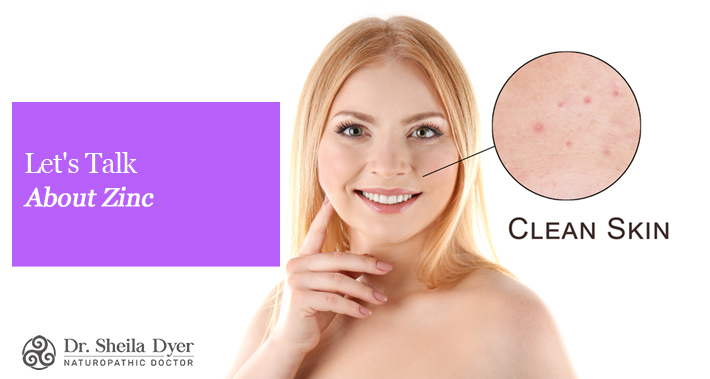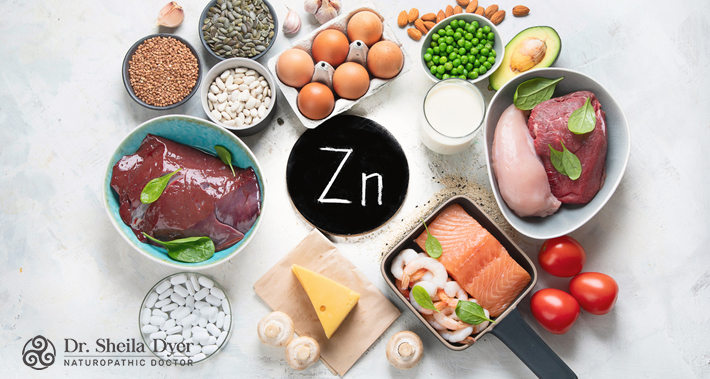There are a lot of different minerals and nutrients your body needs to function at its best.
Some you may have heard of.
Iron helps your blood carry oxygen from your lungs to the rest of the body.
Sodium helps with fluid balance in cells and is important for nerve function.
Calcium is important for maintaining strong teeth and bones.
Others, like zinc, may not be as familiar to many people.
As a skin and acne naturopathic doctor, I often incorporate zinc into the treatment plans for my patients.
Below, we take a closer look at role of this important mineral in the body and it’s many benefits for healthier skin.
Keep reading to find out more, or consider watching my video for additional information.
What Is Zinc?
Zinc is an essential nutrient which is used by your body for a variety of functions.
An essential nutrient means it can’t be produced by the body – you need to get it from either diet or supplementation.
Luckily, zinc is found in a large number of foods, and many others which don’t contain it naturally have been fortified, such as cereals, flour, and snack bars.
There are also a variety of natural cold treatments, such as lozenges and nasal sprays, which contain zinc.
Health Benefits Of Zinc
Zinc plays an important role in keeping you healthy.
Let’s have a closer look at some of the benefits of this important nutrient.
1. It Supports Your Immune System
Getting sufficient zinc is important for your immune system.
It plays a role in immune cell signaling and functioning, meaning that zinc deficiency can result in a weakened immune response.
Zinc can also stimulate immune cells, reduce oxidative stress, and using zinc supplements can help reduce the risk of infections in the elderly.
2. It Decreases Inflammation
Zinc is an antioxidant and has anti inflammatory properties.
It helps to decrease the effects of oxidative stress, as well as reduces some inflammatory proteins in the body.
3. It Keeps You Healthy As You Age
As you age, your risk of certain diseases, such as age related macular degeneration, infection, and pneumonia, increases.
Ensuring you’re getting enough zinc is one way to help reduce your risk of these conditions.
Older people who used zinc supplements also had a better response to flu vaccines.
4. It Helps Your Body Heal Wounds
Zinc helps your body with collagen synthesis, which along with its immune supporting and anti inflammatory properties, is important for healing.
Approximately five percent of your body’s zinc content is found in the skin, and zinc is often used in hospitals as a treatment for skin injuries such as ulcers and burns.
5. It Can Help With Acne
Acne is a skin condition which affects nearly ten percent of all individuals across the globe.
It’s caused by a combination of bacteria, inflammation, and blocked glands.
Zinc treatments – both oral supplements as well as topical creams and ointments, can help reduce the inflammation, inhibit the production of bacteria, as well as suppressing the activity of glands which produce excess oil.
Signs Of Zinc Deficiency
Being deficient in zinc is rare, however, it is more likely to occur in individuals with alcohol addiction, people who are breast or chest feeding, those on certain medications, and some individuals with rare genetic mutations.
Some signs of zinc deficiency can include:
- Impaired growth
- Skin rashes
- Slowed wound healing
- Behavioural issues
- Delayed sexual development
- Increased risk of infection
- Diarrhea
- Lowered immune system
- Poor appetite
- Mood swings
- Thinning hair
- Dry skin
- Fertility issues
Dietary Sources Of Zinc
If you’re looking to get more zinc in your diet, some foods to include are:
- Eggs
- Legumes, including lentils, black beans and chickpeas
- Meat, especially pork, lamb, and beer
- Nuts and seeds
- Dairy products
- Shellfish, including mussels, crab, and oysters
- Whole grains
- Some vegetables, including kale, peas, and mushrooms
- Turkey
- Chicken
- Fish, such as sardines and salmon
The zinc found in animal sources such as meat and shellfish are more easily absorbed by the body than those in plant based sources, which can put vegetarians and vegans at a higher risk of zinc deficiency.
Can You Overdose On Zinc?
It is possible to overdose on zinc, and this is most likely to happen in those who are taking zinc supplements.
Symptoms of a zinc overdose can include:
- Headaches
- Nausea
- Diarrhea
- Reduced immune function
- Abdominal craps
High zinc levels can also interfere with the ability to absorb other nutrients, including iron and copper.
Book Your Appointment With Dr. Sheila Dyer, ND, Today
Are you concerned about the amount of zinc you’re getting?
Maybe you follow a vegetarian or vegan diet, and are worried because plant based sources of zinc aren’t absorbed by the body as easily as those from animal sources.
Or maybe you have a condition such as kidney disease or Crohn’s disease which can put you at a higher risk for zinc deficiency.
I’m Dr. Shelia Dyer ND, a naturopathic doctor in Toronto, and I can help, with concerns for all of the vitamins and nutrients your body needs, from vitamin A, all the way through to zinc.
Book an appointment with me today, and we’ll make sure your body is getting everything it needs to function at its peak.
If you have questions about naturopathic medicine, or would like to start with your first consultation, contact me, and let’s book an appointment.
Dr. Sheila Dyer, ND1080 Dovercourt Rd,
Toronto, ON M6H 2X8
(416) 554-5135
► https://g.page/DrSheilaDyerNd
Dr. Sheila Dyer is a Naturopathic Doctor and a practicing registered nurse offering holistic healthcare with a scientific focus

